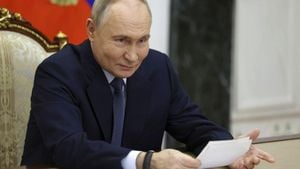France is stepping up its military support for Ukraine, announcing it will allow the use of long-range missiles to target Russian positions. French Foreign Minister Jean-Noël Barrot made these remarks, emphasizing there should be no restrictions or 'red lines' when it came to aiding Ukraine. He stated, "The principle has been set... our messages to President Zelensky have been well received." Barrot stressed the significance of supporting Ukraine was directly tied to European security, indicating each Russian gain brings the threat closer to Europe.
Meanwhile, the U.S. has also announced changes to its policy concerning military aid. President Biden has shifted his stance, now allowing Ukraine to use American-made ATACMS missiles to strike deep inside Russian territory. This new authorization follows the escalated involvement of North Korean troops on Russian soil, particularly in the Kursk region, which created urgency for the U.S. to respond. This policy change reflects the Biden administration’s need to bolster Ukraine’s position amid concerns over diminished support should Donald Trump regain power.
Historically, Biden had been cautious about enabling Ukraine to use these long-range missiles for fear of provoking Russia and drawing NATO directly toward conflict. Yet, the unprecedented situation – with North Korean forces deploying to aid Russia – has shifted thinking, as described by sources familiar with U.S. policy. The North Korean troops reportedly arrived via ships to Vladivostok and were transported to specific military training bases within Russia.
During discussions between Biden and your allies, there was acknowledgment of the necessity to help Ukraine strike at strategic military sites, such as air bases used by Russian forces. One clear outcome of this policy shift was Ukraine's first use of U.S. ATACMS missiles, which hit an arms depot roughly 70 miles inside Russian territory.
This adjustment of U.S. military strategy also involved coordination with NATO allies. Following Biden’s decision, discussions took place with other countries, and Ukraine received clearance to launch British Storm Shadow missiles, enhancing its ability to strike within Russian borders.
The situation is fluid, with differing opinions within U.S. circles about the impacts of longer-range strikes. Some officials express skepticism about whether such actions significantly alter Russia’s operational capabilities, especially since Russian military targets have begun shifting out of missile range. This apprehension has nevertheless created insight about the boundary lines of U.S. military support moving forward.
The geopolitical dynamics surrounding Ukraine are increasingly complicated. With the backdrop of North Korean involvement, as well as the potential return of Trump to U.S. leadership, there is growing concern over sustaining military assistance to Ukraine and the ramifications of U.S. policy changes. One anonymous source suggests the new policy is largely aimed at constraining the Russian-North Korean offensive against Ukraine, particularly within regions where Ukraine has established control.
While fears of escalated conflict linger as the new policies roll out, both France and the U.S. appear committed to supporting Ukraine as it confronts Russian aggressions. Barrot emphasized, "We will support Ukraine as intensely and as long as necessary." Such statements reinforce the notion of solidarity among allies facing the continuing threat of Russian military expansion.
Looking forward, military analysts continue to evaluate the shifting balance of power. The prospect of North Korean troops operating alongside Russian forces adds to the uncertainties of the conflict. The U.S. remains cautious but faces pressures to strengthen Ukrainian forces amid mounting expectations of what support entails.
With winter approaching and military strategies adapting, the situation calls for constant vigilance. It remains to be seen how these missile policy changes will play out and what they mean for Ukraine’s broader military strategy. Observers are attentive to the future maneuvers of both sides as the conflict evolves.
Clearly, the stakes are high not only for Ukraine, but also for Europe’s security. France’s stance, alongside U.S. policy adjustments, indicates there’s readiness to confront increasing threats posed by Russia and its allies, with discussions likely to continue as the war drags on.



